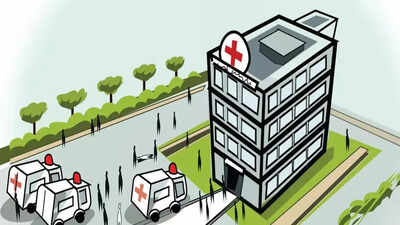Kasba Peth woman critical as 6 test positive for leptospirosis in Pune

Representative Image
PUNE: Six people have tested positive for leptospirosis, the dreaded bacterial infection, in the last few days in the city, doctors said on Wednesday. The condition of one of them, a woman, is critical.
"The woman is a homemaker from Kasba Peth, whos liver and lungs have been severely affected. At a time when our wards and ICUs are filled with patients infected with H1N1, dengue and Covid cases, leptospirosis is one more addition," said KEM hospital's senior physician Dr Rajesh Gadia.
Dr Gadia has come across four patients with a lab-confirmed diagnosis of leptospirosis in the last few days. "One was a 40-year-old mutton shop operator from Kondhwa," he said. Two other patients were from Somwar Peth.
Leptospirosis is usually considered a disease of farmers and animal handlers in the monsoon.
Leptospirosis, a disease often associated with farmers and animal handlers, has left six unwell and one among them critical in the city. “Finding cases in the city areas is considered unusual. But in view of the presence of stray animals on the city’s roads and rodents in the sewage, citizens can come in direct contact with water or food contaminated with animal urine and feces, resulting in leptospirosis,” said KEM hospital’s senior physician Dr Rajesh Gadia.
The common way of contracting the infection is urine or contaminated water getting into a person’s eyes, nose, mouth or broken skin ( a cut or ascratch). “People can also get infected by consuming contaminated food or water. Some people with leptospirosis show no symptoms,” he said. Critical care expert Dr Subhal Dixit of Sanjeevan Hospital, Karvenagar, said, “I recently treated a patient from Kasba Peth for leptospirosis. He had moderate symptoms and recovered in a few days.”
Leptospirosis can cause a wide range of symptoms, some of which may be mistaken for other diseases. “If left untreated, leptospirosis can lead to kidney damage, meningitis (inflammation of the membrane around the brain and spinal cord), liver failure, respiratory distress, and even death,” said Sahyadri hospital’s critical care expert Dr Kapil Borawake. He treated a patient from Hadapsar two weeks ago. Dr Sanjeev Wavare, a senior health official of the PMC, told TOI, “People must be cautious while wading through rainwater.
If it is contaminated with leptospira bacteria and a person has cuts/scratches on the legs, s/ he may develop the disease.” Health activist Dr Sanjay Dabhade said, “The city’s drainage lines are infested with rodents. Their body wastes spill out on the roads during the rains when the lines get choked, exposing citizens to the infection.”
"The woman is a homemaker from Kasba Peth, whos liver and lungs have been severely affected. At a time when our wards and ICUs are filled with patients infected with H1N1, dengue and Covid cases, leptospirosis is one more addition," said KEM hospital's senior physician Dr Rajesh Gadia.
Dr Gadia has come across four patients with a lab-confirmed diagnosis of leptospirosis in the last few days. "One was a 40-year-old mutton shop operator from Kondhwa," he said. Two other patients were from Somwar Peth.
Leptospirosis is usually considered a disease of farmers and animal handlers in the monsoon.
Leptospirosis, a disease often associated with farmers and animal handlers, has left six unwell and one among them critical in the city. “Finding cases in the city areas is considered unusual. But in view of the presence of stray animals on the city’s roads and rodents in the sewage, citizens can come in direct contact with water or food contaminated with animal urine and feces, resulting in leptospirosis,” said KEM hospital’s senior physician Dr Rajesh Gadia.
The common way of contracting the infection is urine or contaminated water getting into a person’s eyes, nose, mouth or broken skin ( a cut or ascratch). “People can also get infected by consuming contaminated food or water. Some people with leptospirosis show no symptoms,” he said. Critical care expert Dr Subhal Dixit of Sanjeevan Hospital, Karvenagar, said, “I recently treated a patient from Kasba Peth for leptospirosis. He had moderate symptoms and recovered in a few days.”
Leptospirosis can cause a wide range of symptoms, some of which may be mistaken for other diseases. “If left untreated, leptospirosis can lead to kidney damage, meningitis (inflammation of the membrane around the brain and spinal cord), liver failure, respiratory distress, and even death,” said Sahyadri hospital’s critical care expert Dr Kapil Borawake. He treated a patient from Hadapsar two weeks ago. Dr Sanjeev Wavare, a senior health official of the PMC, told TOI, “People must be cautious while wading through rainwater.
If it is contaminated with leptospira bacteria and a person has cuts/scratches on the legs, s/ he may develop the disease.” Health activist Dr Sanjay Dabhade said, “The city’s drainage lines are infested with rodents. Their body wastes spill out on the roads during the rains when the lines get choked, exposing citizens to the infection.”
FOLLOW US ON SOCIAL MEDIA
FacebookTwitterInstagramKOO APPYOUTUBE

Start a Conversation
end of article










